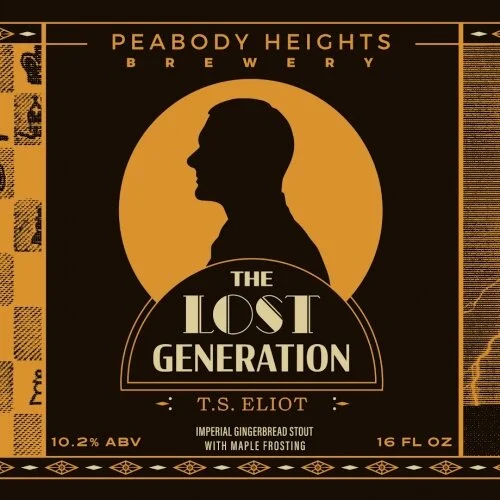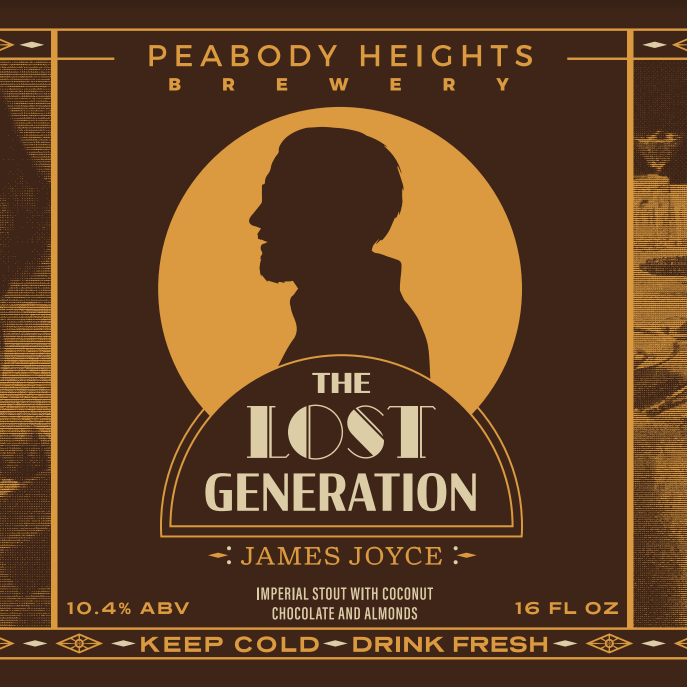"Dulce et Decorum Est" and Peabody Height's T.S. Eliot Lost Generation
The Beer: Peabody Heights Lost Generation series - T.S. Eliot
I couldn’t resist snagging this very literary beer when I came across it in a beer shop in a Bethesda strip mall last month. I hadn’t heard of the brewery, Peabody Heights, and can’t find too much about it online now, either. I’d like to visit the brewery in Baltimore in order to learn more, and also because their brewery occupies a really cool space, historically. As their “About” page explains:
The site was home to Terrapin Park from 1914-1944. The Park was a wooden stadium that hosted a variety of teams including the Negro American League Baltimore Elite Giants, Federal League Baltimore Terrapins, and minor league Baltimore Orioles.
Their current beer line-up includes two entries in their “Lost Generation” series: Thomas Wolfe and James Joyce. They describe the former as “[a]nother thick and scrumptious stout in our Lost Generation series. With caramel, peanuts, and pretzels this brew is complex and decadent.” The James Joyce, they note, is “thick and chocolatey with sweet coconut on the nose that transitions to sugary caramel cascading on the palate. To round off the candy bar feel it finishes with just a touch almonds.”
The “Lost Generation” beer that I found, though, is the T.S. Eliot. It’s another humongous stout (clocking in at 10.2% ABV) with sweet frills: gingerbread and maple frosting.
I’ve been flummoxed, lately, about why breweries can such high ABV beers in sixteen- instead of twelve-ounce cans. When it comes to T.S. Eliot (and the rest of this Lost Generation series, from the sound of it), I’d have to share even twelve ounces, not just because they’re ABVs are elevated but also because they’re so sweet.
The Poem: Wilfred Owens’s “Dulce et Decorum Est”
For that reason — the sweetness — I’m not sure that this series is the most apt namesake of the Lost Generation.
The Modernist poet Gertrude Stein coined the phrase “the lost generation” (at least supposedly) in reference to her generation. Hemingway popularized it; the epigraph to The Sun Also Rises (1926) reads, “You are all a lost generation.”
World War I, of course, caused the “loss” of this generation. This conflict saw the rise of trench warfare, aerial bombing, and chemical assaults. A generation of men were lost to this radical violence.
This week, I’ve been reading Kazuo Ishiguro’s An Artist of the Floating World, a novel in which the narrator grapples with his past as a propaganda artist for the Japanese empire during World War II. This narrator remains, largely, more proud than ashamed of his role in the war, even though it cost him his son, Kenji. In a story that revolves around jingoism, I kept thinking of Wilfred Owens’s “Dulce et Decorum Est” (1917-1918), which castigates such homicidal, suicidal patriotism.
Here’s “Dulce et Decorum Est” in its entirety, since it’s pretty short and utterly stunning:
Bent double, like old beggars under sacks,
Knock-kneed, coughing like hags, we cursed through sludge,
Till on the haunting flares we turned our backs,
And towards our distant rest began to trudge.
Men marched asleep. Many had lost their boots,
But limped on, blood-shod. All went lame; all blind;
Drunk with fatigue; deaf even to the hoots
Of gas-shells dropping softly behind.
Gas! GAS! Quick, boys!—An ecstasy of fumbling
Fitting the clumsy helmets just in time,
But someone still was yelling out and stumbling
And flound’ring like a man in fire or lime.—
Dim through the misty panes and thick green light,
As under a green sea, I saw him drowning.
In all my dreams before my helpless sight,
He plunges at me, guttering, choking, drowning.
If in some smothering dreams, you too could pace
Behind the wagon that we flung him in,
And watch the white eyes writhing in his face,
His hanging face, like a devil’s sick of sin;
If you could hear, at every jolt, the blood
Come gargling from the froth-corrupted lungs,
Obscene as cancer, bitter as the cud
Of vile, incurable sores on innocent tongues,—
My friend, you would not tell with such high zest
To children ardent for some desperate glory,
The old Lie: Dulce et decorum est
Pro patria mori.
Owens experienced this scene first-hand: he entered the war as an idealistic youth, wrote some of the best war poetry from the trenches and hospital in 1917 and 1918, and was killed in battle in November 1918, a week before the Armistice, at the age of twenty-five.
That last line - “the old Lie” - is from Horace. Translated, it reads, “It is sweet and fitting to die for one’s country.” Despite bearing testament to a “lie,” the poem’s rhyme scheme stays perfectly A/B/A/B throughout. On the surface, things sound right, and early in the poem, they look right, too: all of the rhymes in the first two stanzas not only sound perfect, their spelling mirrors exactly, too (“stumbling/fumbling,” “backs/sacks,” “sludge/trudge”). In the third stanza, though, this falls apart: when Owens rhymes “drowning” with “drowning,” as if he’s so shaken by the sight of losing his comrade that even this master poet can’t reach (“stumble/fumble”) for another word that rhymes.
After this point, while the rhymes remain perfect homonyms, something is amiss: they are now far from orthographic mirrors (“blood/cud,” “lungs/tongues,” before we land in words that rhyme but aren’t even of the same language: “zest/est,” “glory/mori”). Everything may still sound right, like that simple Horatian adage does, certainly. But look deeper, Owens rhymes attest, and things no longer line up in this horrific, ideal-breaking war.
We could trace the same development through an examination of Owens’s line breaks, similes, and alliteration. On every level, this poem survives as a testament against “the old Lie” that war is sweet, a lie that has existed ever since Horace but bears new witness when it comes to the first world war.
For that reason, there’s a dissonance, for me, between Peabody Heights’s very sweet series and its literary namesake, the Lost Generation. I love a good literary series of beer, though, even if this week it strikes me as a bit misnamed.








